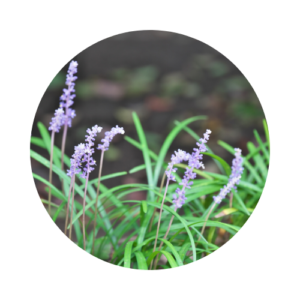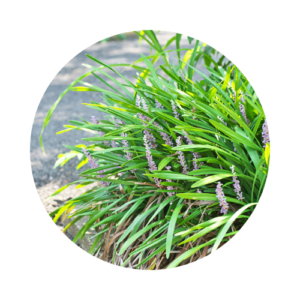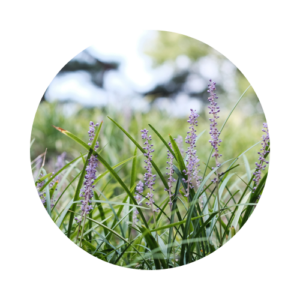Monkey grass forms the boundary of my earliest memories.
Our small suburban yard—mom called it our postage stamp yard—had been intentionally designed as a place for children to thrive. It was perfect for my sister, my brother, and me. It boasted a climbing rope, a sandbox, a small above-ground swimming pool, a sprinkler, a swing set, and a slide. It included a rich variety of surfaces and spaces. Thick grass, concrete driveway, sand in the sandbox, mulch under the swing set, landscaping stones in the oddly forbidding alleyway behind the house, and plenty of dust between the exposed roots of the maple tree.
Surrounding it all was monkey grass—tall, dense, deeply green. Smoky purple blossoms on slender stalks arched well above the cascading grasses. I remember an impulse to collect the blossoms, to run my fingers down each stem, blossoms popping in a satisfying cadence under my touch and piling around my feet. Yet, I don’t remember if I ever tried. I wonder if we had been told not to.
Monkey grass both witnessed and framed our exploits.
It rippled below me as I climbed the knotted yellow rope, slightly too thick for my hands to reach around it, as I swayed, perched on the top knot—just below the treetops—victorious and feeling every inch a monkey.
It concealed roly polys and crickets, gleefully collected in gallon pickle jars provided by our neighbor’s grandfather complete with nail holes in the metal lids. Every hunt was the same—the consuming desire to possess, the frantic pursuit, the glee and terror of the moment when one actually touched a bug and shoved it through the jar’s opening, the rising panic of responsibility (What do these bugs eat? How do I care for them?), the flurry of provision, the apprehensive observation as no bugs consumed our offerings, and finally, the resignation and release. Into the safety of the jungle we would return them. Until next time.
My older sister Missi and I moved through this jungle as a unit. We hunted bugs, tracked birds, climbed trees, and built and flooded sand villages. We played dress up and swang and sang and schemed together.
Whiling away a long afternoon, we hatched a plan to become spiders and terrify our mother by our transformation. After soaking ourselves in the plastic pool so that everything would stick, we successively rolled in freshly mown grass, mulch, dust, and, judiciously, the smaller and less painful landscaping pebbles.
We vaguely understood that we needed more legs, and should probably have webs, but we were satisfied that we still closely resembled spiders and closed in for the attack. Our mother, who was on the phone when she opened the door to our giddy, we hoped arachnid-like knock, quickly hung up and ushered us out the back door to the garage where she laughingly offered her spiders popsicles in exchange for a good hosing off. I chose orange; I believe my sister chose red. Wrapped in beach towels, we settled into our little folding lawn chairs, inordinately satisfied with our adventure.
Part of the strength of our unit came from our solidarity against our younger brother. Two years younger than me and intensely annoying to us both, Eric followed us outside whenever possible. Suddenly, our expansive jungle became suffocating. We couldn’t climb trees when he was outside. We had to swing carefully so we wouldn’t hit him. He couldn’t climb the ladder to use the slide without help. He destroyed our sandcastles and threw dead leaves in the sand we carefully cleared of debris each time we played.
Initially our policy had been to carry on as if he simply weren’t there. However, we had verbalized this strategy one too many times and he began to report to our mother that we were telling each other to ignore him.
In this time of crisis, we devised a secret code to protect ourselves from invasion: “Him ig.” A simple abbreviation and inversion of our previous plan, but much too sophisticated for him to decipher, we assured each other in superior and deliciously conspiratorial tones. If we were already in the trees when he came trooping outside, we would hiss “Him ig” to each other and freeze. By all appearances, we hadn’t seen him or heard his cries for us; thus, we couldn’t be held responsible for not responding.
If he happened to catch us on the swings or in the sandbox, the him ig strategy was not possible, so we improvised. We would exploit his weakness for scrambled eggs. We would tolerate him as long as we could, and when he was finally more than we could handle, we would assure him that we had just heard mom calling to him that she had eggs ready for him. He would eagerly rush to the kitchen for his eggs. It worked like a charm every time.

It was in the shadow of the monkey grass that I first learned we were not indivisible. The pickle bug jar neighbor was having a birthday party and had brought us an invitation to see The Jungle Book at the movie theater. But is wasn’t for us. It was for Missi. Not me. Just her. Only her. Our neighbor was my sister’s friend, not mine. I wasn’t her friend. She played with my sister because they were friends; she played with me because I was there. She saw us differently. We weren’t her friends.
I watched carefully, waiting for surprise on my sister’s face, waiting for her to correct the mistake, to say that of course I would be coming too. But I saw only enthusiasm. Waves of embarrassment, humiliation, and rejection pounded like surf in my ears. I longed for my sister to defend me, to beg for my inclusion. But I discovered that it wasn’t a glaring error in her eyes. She understood that we were different, separate beings. And now I did too.
We had declared the waist-high decorative border “monkey grass” well before my conscious memory, but I recall the firm knowledge that we had named it and the confidence that in naming it we had made it our own. We were jungle animals, explorers, conquerors. Together.
Suddenly alone, the jungle felt frightening.
My parents are incidental to my memories in the monkey grass. My mother facilitated. She provided popsicles, chalk, beach towels, and band-aids. She was usually indoors, and I treasure memories of Sunday morning cinnamon rolls and her gentle, soothing fingers patiently running through my hair as I fell asleep to stories about a Native American girl with a beautiful name I no longer know but I ache to recall. She colored with me once. I still treasure her picture of the fox about to snap up the gingerbread man mid-stream.
My father faded in and out. He came in each evening to ecstatic choruses of “Daddy, daddy, daddy!” and went out each morning to frantic waving and triangles, a family tradition of holding up a triangle created with thumb and forefingers that meant “love you bunches.”
I do remember one snowball fight. Snow was rare and sparse in our little suburb of Dallas, but one time there was just enough to cobble together a few snowballs, and at my father’s invitation, my sister and I eagerly flew into production, scooping snow from the driveway bordered by frosted but still verdant monkey grass. She was much better than I. My snowballs fell apart mid-flight while hers hit my father’s old football jacket with a satisfying thump.
Then I spied a snowball ready-made on the ground, perhaps a cast-off of my father’s. My aim was poor and my arm was weak, but I hurled that snowball with everything I had, and it smacked squarely on the back pocket of his jeans. Ecstatic, I felt for an instant that I was really doing this! He turned around flushed and angry. Through my whirring and frantic confusion, I learned that the perfectly shaped snowball had been a ball of ice. Horrified and humiliated, I wanted to explain, to know he understood, to receive reassurance. But the snowball fight was over. Because of me.
On hot summer evenings Dad often joined us in the pool which was tucked into an extra parking spot fringed by monkey grass that became ever more unfamiliar and intimidating in the dark. We were glad not to be alone. He taught us to do flips underwater and called me his little fish.
When my younger sister was born, we learned that we would be getting rid of the pool to make room for a station wagon in the driveway. As Dad disassembled the pool in preparation, the stained circle it left on the driveway looked so foreign and forlorn, smaller than I expected within its hedge of unkempt monkey grass.

Many years later, when life circumstances required that I leave my husband, I hoped temporarily, I found a tiny little yellow house right at the divide between the respectable and sketchy parts of town. It needed some work. Scratched into the fresh coat of deceptively innocuous looking cream paint on the living room wall was the word Fuck. The front door opened directly into the master bedroom. The back door opened into a catch-all space with a lofted ceiling—part laundry room, part mud room, part access to the cellar in case of tornados or problems with the water heater.
Yet there was a lovely bench, suggestive of catnaps and good books, built in front of a large window with the afternoon sun streaming in. The living room was a step down and to the left, the only bathroom straight ahead. But the wall closing off the bathroom rose to the height of the door and stopped. The space between the door and lofted ceiling was empty and horrifyingly open.
This was an older home. There had been many renters. No one had complained. Knowing I couldn’t afford anything else, I still made it a condition of the lease that the landlord complete the wall. No open-air bathroom for me. As I walked away, freshly-signed lease in hand, I noticed that the front walk was lined with monkey grass, and I instantly felt at home, and a little excited about my new adventure, whatever it might bring.
I thought my sister and I had made up the name “monkey grass.” As an adult, curious about its real name, I Googled decorative grasses until I narrowed it down to liriope muscari, only to find that it is commonly called monkey grass. Did we make it up? Or had my sister been told the name at an earlier point and only I thought we had created it? I miss the sense of secrecy, of privacy, of immediacy, of ownership that comes with naming something. I begin to feel a sense of distance from my own memories, and my childhood feels a little more generic.
Yet at times, I wrap up in an afghan of vibrant memories fringed by monkey grass and methodically run my fingers through its knowing stalks. They are ever green and ever present. Protective, concealing, comfortable, safe.

Rachel Brown
enjoys sipping tea, savoring good books, and spending time outside.
She is daily inspired to live more deeply and love more fully by her husband and two children.

One Response
Love your childhood accounts. It is so important for our children to understand who we were, to understand that we once were children, too. Perhaps it is even more important for each of us to thoughtfully explore our childhoods. I look forward to reading more accounts and to sharing some of my own memories. Thank-you, Rachel